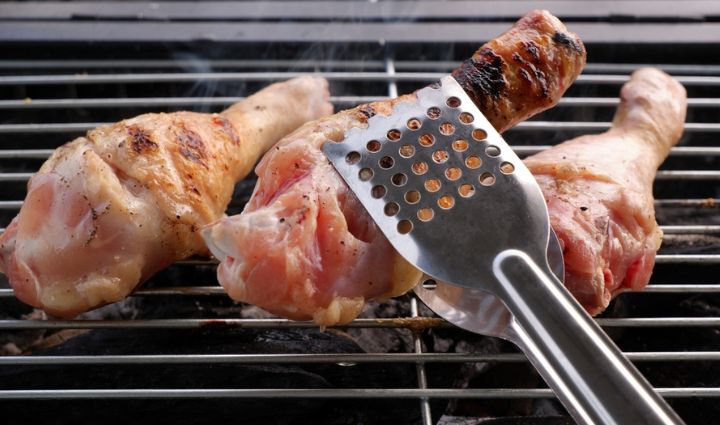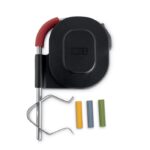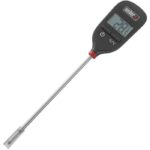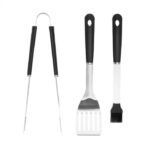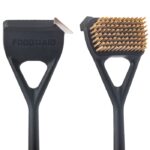Discover why food sticks to your grill and learn how to prevent it. Key factors include improper preheating, incorrect temperature, dirty grates, and using the wrong oil. By understanding these causes and making simple adjustments like proper cleaning, preheating, and oiling, you can enjoy a non-stick grilling experience every time.
Nothing can dampen the excitement of a grill sesh faster than food stubbornly sticking to your grill. If chicken sticks to your grill (or any meat sticks to your grill, for that matter), don’t worry—it’s a common problem that many grillers encounter.
Food sticking isn’t the end of the world, but it can ruin the look of your meal and make cooking and cleanup a frustrating ordeal. Fortunately, with a little understanding of why meat sticks to a grill, along with a few simple adjustments to your grilling routine, you can keep your food from sticking and enjoy a hassle-free grilling experience.
In this post, we’ll explore the science behind why food sticks to the grill, the key factors that contribute to this issue, offer practical tips for how to keep meat from sticking to your grill, and share our expert advice for how to make a BBQ grill non-stick.
Let’s get grilling!
Why Does Food Stick To My Grill?
If you’re researching how to keep food from sticking to your grill, it helps to understand why food sticks to your grill.
Meat sticks to the grill because of the physical and chemical reactions that occur when the meat is exposed to high heat. The moisture in the meat evaporates quickly, and because the natural oils in the meat haven’t had a chance to properly heat up, the proteins can burn and create a layer of dry, hard material that won’t allow those natural oils to escape. No natural oils means things will start to stick.
Oiling your grill (or your meat) before you start grilling gives the natural fats enough time to melt, helping to avoid that protein burn that makes things stick.
GRILL SPOT TIP: The leaner the meat, the more likely it is to stick. Chicken sticks to a grill especially when it’s boneless and skinless. Fish and pork tenderloin are also common culprits.
High sugar content in marinades
Sugary marinades can caramelize quickly and stick to the grill, especially if you’re cooking at high temperatures.
Key Factors That Lead to Meat Sticking to the Grill
Food stick ultimately boils down to three key factors:
- Temperature: Meat sticks to a grill when the heat is too high or too low. The temperature of your food matters too—if your meat is fridge-cold, it will stick. We recommend giving your meat a chance to come to room temperature before grilling.
- Time: If you don’t give your grates enough time to properly pre-heat, meat and chicken will stick to your grill. If you try to flip your food too soon, your meat will also stick. Patience is key!
- Grate Material: Different grate materials require different prep to avoid sticking. More on this below!
Let’s dig deeper into the various factors that can cause chicken to stick to your grill (and other meats, too).
Preheating problems
One of the most common reasons why meat sticks to the grill is because the grill grates aren’t properly preheated. Without enough heat in the metal, food can bond to the grates before it has a chance to sear.
SOLUTION: Give your grates at least 10 minutes to preheat before you put meat on them.
Temperature troubles
If your grill is too hot, the proteins in your food can burn, creating a dry, sticky layer that bonds to the grill grates. On the other hand, if the temperature is too low, food can bond to the metal before it has a chance to sear.
SOLUTION: Use a grill thermometer to monitor the temperature of your grill grates.
Flipping too quickly
If you try to flip your food too soon, the meat will stick to your grill. Instead, wait until the food naturally releases from the grates before turning it. Look for visual cues, such as a golden-brown crust forming on meats, to know when it’s time to flip. Patience is key—don’t rush this step.
SOLUTION: Don’t force things to flip. Wait for your meat to naturally release from the grill—it’ll flip when it’s ready!
Grate material
For cast iron grates, slow and steady pre-heating and a good seasoning is key to avoiding sticking. Stainless steel grates also require oiling to prevent sticking, as well as regular seasoning to maintain their non-stick properties. Porcelain-coated grates are more delicate and can chip if handled roughly, which may lead to sticking over time.
SOLUTION: Take good care of your grill grates! Reseason your grill grates every couple of uses to preserve your non-stick surface.
Dirty grill grates
Leftover residue from previous grilling sessions, such as burnt-on food particles and grease, can create a sticky surface. Even if you oil the grates or your food, old food particles can cause new food to stick.
SOLUTION: Clean your grill grates after each use.
Inadequate oiling
Both the grill grates and the food need to be properly oiled. Without a layer of oil, the natural fats in the food don’t have a chance to protect against sticking. The kind of oil you use matters too—oils with lower smoke points will burn and are more likely to stick.
SOLUTION: Oil your grill grates before each use. When grilling, use oils with a higher smoke point to avoid burning and stick. We recommend safflower or refined avocado oil. Check out our cooking oil smoke point chart to learn more.
High sugar content in marinades
Sugary marinades can caramelize quickly and stick to the grill, especially if you’re cooking at high temperatures.
SOLUTION: Apply sweeter sauces towards the end of your cook so they don’t have a chance to burn and stick. If you’re using a sweet marinade, cooking at a lower temperature can also help you prevent food from sticking.
How to Stop Meat from Sticking to your Grill
Now that you understand the various factors that can lead to meat sticking to your grill, we can take a look at how to keep food from sticking to your grill.
1. Make sure your grill grates are clean before you start cooking, regardless of material
You should always clean your grill grates before cooking, no matter how well seasoned your grates are or how much oil you add before grilling. If there’s leftover gunk or carbon build up, you will get food sticking, so it’s important to scrape off any residue before your meal hits the grill.
You can give your grates a quick clean while they’re still hot after a cook, or while your grill is preheating. Just let them warm up, heat for 5-10 mins, then brush the grates vigorously before applying a fresh layer of oil.
GRILL SPOT TIP: If fatty meats like steak and burgers are sticking to your grill, there’s a good chance your grates are dirty and need reseasoning (or you didn’t heat them properly).
2. Give your grates enough time to properly preheat
If your grill isn’t hot enough, food will stick because there isn’t enough conductive heat in the metal. Without enough heat, a chemical bond will form between the food and the grates and will inevitably lead to sticking.
For cast iron grates, start heating them at a lower temperature (under 350°F) for at least 5 minutes, then gradually increase the heat to your desired level. This allows the grates to heat evenly, reducing the risk of sticking.
Stainless steel grates can be heated a bit faster but still need proper preheating. All in all, you should give your grates at least 10-15 minutes to heat evenly.
GRILL SPOT TIP: Your grill thermometer might say you’ve reached 400 degrees, but the thermometer on your grill lid only measures the ambient temperature inside the cookbox (and it’s not necessarily that accurate). The ambient temp isn’t the same as the grate temperature, so don’t rush this step. Make sure you give your grates lots of time to heat up as well. An ambient temperature thermometer and grill grate thermometer can help you ensure your grill is properly preheated.
3. Don’t force things to flip
Because it’s so lean, chicken often sticks to a grill. Whatever you’re cooking, if you’re trying to flip stuff and it’s sticking, stop trying, close the lid, and check again in a couple of minutes. Meat (lean or otherwise) will release easily when it’s ready (assuming you’ve followed steps 1 and 2).
4. Use the right oil
Certain types of oil just aren’t ideal for grilling. Always use an oil with a high smoke point, such as avocado oil, peanut oil, or safflower oil. Oils with low smoke points will break, carbonize, and burn instantly. This not only tastes bad, but can make a normally non-stick surface annoyingly sticky. Check out our cooking oil smoke point chart to learn more about the best oils for grilling.
Apply oil to the grates with a paper towel dipped in oil and held with tongs. Non-stick cooking sprays can work as well, but they are highly flammable, so you should only apply them when the grill is turned off and the grates are cold.
You can also oil your food to prevent sticking, but not all foods need pre-oiling—marinated food, as well as fattier meats like burgers, sausages, steaks, or skin-on chicken typically don’t require pre-oiling.
5. Prep your food properly
Avoid drowning your food in marinades. Too much liquid will steam your meat and prevent it from getting a good sear, so always let a bit of marinade drip off your meat before you place it off the grill, or better yet, pat it dry with a paper towel before grilling.
If you’re using a sugary marinade, it can quickly burn and stick to the grill. We recommend avoiding super sweet marinades, or applying sweeter sauces during the last few minutes of cooking.
Shop for grilling tools:
What to Do If Your Food Does Stick
Despite your best efforts, food may still stick from time to time. Here’s how to handle it:
- Lower the heat: Reduce the grill’s temperature to minimize further sticking.
- Use a well-oiled spatula: Gently work around the edges of the food with a wide spatula that has been lightly oiled. This will help release the food without tearing it.
- Clean up residue: After removing the food, clean the grates to prevent future sticking and to keep your grill in good condition.
Common Mistakes and How to Avoid Them
If meat is sticking to your grill and you’ve tried making the adjustments we’ve discussed above, you might be making one of these common mistakes:
- Overcrowding the grill: Overcrowding the grill can lead to uneven cooking and increased sticking. Give each piece of food enough space to cook properly and develop a good sear.
- Using too much sauce: Applying too much sauce, especially a sugary one, can lead to sticking. Instead, brush sauces on during the last few minutes of cooking to avoid burning and sticking.
- Not using a grill basket for delicate foods: For delicate foods like fish or vegetables, using a grill basket can prevent them from falling apart and sticking to the grates.
How To Make a BBQ Grill Non-Stick
The key to making your grill grates non-stick is regular cleaning and proper maintenance.
After each use, clean your grates to prevent the buildup of food and grease, which can lead to sticking.
- For stainless steel grates, use a non-metal bristle brush and, if needed, a baking soda and vinegar solution for tougher debris.
- Cast iron grates require seasoning after cleaning to maintain their non-stick surface.
- Porcelain-coated grates should be cleaned gently with a soft brush to avoid chipping the coating.
For more detailed instructions on how to make a BBQ grill non-stick, read our grill grate cleaning and seasoning guide.
Get Grilling!
Preventing food from sticking to your grill is all about preparation—clean grates, proper preheating, and the right use of oil can make all the difference. By understanding the science behind sticking and implementing these tips, you can enjoy a smoother, more satisfying grilling experience.

